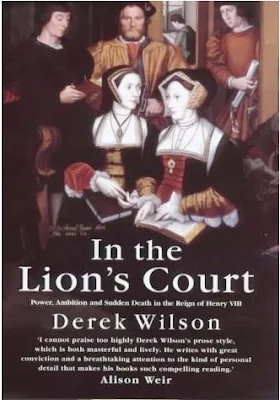My Review of In The Lion's Court: Power, Ambition and Sudden Death in the Reign of Henry VIII - A Study in Political Intrigue By Derek Wilson
‘You often boast to me that you
have the king’s ear and often have fun with him, freely and according to your
whims. This is like having fun with tamed lions – often it is harmless, but
just as often there is fear of harm. Often he roars in rage for no known
reason, and suddenly the fun becomes fatal.’ Thomas More
For anyone endeavoring
to understand the reign of Henry VIII, King of England, and or the man Henry
Tudor himself, the focus has been to turn to his infamous six wives for the
answer. However, writer and novelist, Derek Wilson gives us the answers through
the eyes of the Six Thomases’ orbiting around the man himself: Thomas Wolsey, Thomas More, Thomas Cromwell,
Thomas Howard, Thomas Wriothesley and Thomas Cranmer.
Derek Wilson also gives
us another mnemonic: Died, beheaded,
beheaded, Self-slaughtered, burned survived.
Between 1509 and 1547,
these six men were the most closely involved with the governing king of the
empire of England. Thomas Wolsey was an accused traitor finding himself on the
way to the block when a kinder death took him.
Thomas More and Thomas Cromwell could
not have had more varying policies, convictions and could not have been more
different. They had one thing in common
though; they were both to perish by headman’s axe. Thomas Howard, Duke of Norfolk, would have
been beheaded if it were not for the death of Henry VIII bringing an eleventh
hour reprieve. Thomas Wriothesley, Earl of Southampton, and Thomas Cranmer,
Archbishop of Canterbury, outlived Henry VIII but died due to a faction war of
ambitions and ideologies which went on until 1547. After a failed coup,
Wriothesley succumbed to what was either poison of body or mind. Thomas Cranmer
went to the stake as a heretic at Mary Tudor’s insistence; she truly turned out
to be a chip off the old block (pardon the pun).
A very honorable
mention goes to perhaps one of the most important of Henry’s men; a German
painter of the divine nature, Hans Holbein. Hans etched, engraved, sketched and
painted the men and women who populated the corridors of Greenwich and
Whitehall Palace, leaving a legacy and a glimpse into the Tudor world.
‘In the Lions Court’
also covers the splendor of the Field of Cloth of Gold, the struggle for the
royal dispensation, the dissolution of the monastaries which turned out to be
history’s largest single act of nationalism, the Pilgrimage of Grace which
almost toppled the throne. Also,the
sudden ending of Thomas Cromwell, a man who made his ruler the richest in
Christendom.
Derek Wilson provides his readers with a huge cast: six
protagonists, Henry and his wives, along with various other minor players in
this Tudor drama. Overall, it is an interesting historical biography where trying
to keep the Thomases’ straight might just be the only confusing factor to this
glorious read.
For more information about the author, Derek Wilson
Please feel free to leave any comments,

Comments